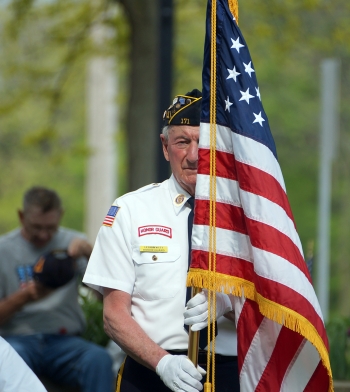Approximately 8% of adults in America experience post-traumatic stress disorder (PTSD) every year. Some people develop the condition after experiencing or witnessing a life-threatening event, like combat, a natural disaster, a car accident or sexual assault.
Rates are higher in Veterans, particularly those who receive their health care from VA, including 12% of Veterans overall and 26% of OEF/OIF Veterans.
As the nation’s leading provider of effective trauma-focused treatments for the condition, VA offers hope of healing for the silent wounds of war while training future health professionals in VA’s gold standard of PTSD care.
Exceptional training found only at VA
VA’s National Center for PTSD is the world’s leading research and educational center of excellence on PTSD and traumatic stress. At VA sites across the country, VA health professions trainees receive exceptional training and experience, preparing them for the workforce at VA or in their communities.
Many highly trained experienced VA professionals go on to teach health professions trainees in the condition’s treatments. VA trainees learning Cognitive Processing Therapy (CPT) participate in a six-month consultation with a trained consultant.
With more than 70 percent of VA psychologists reporting they completed training in VA, our education mission significantly impacts Veteran care.
VA staff are provided structured training in PTSD treatments such as CPT and Prolonged Exposure (PE).
CPT helps people recognize how trauma has changed their view about themselves, others and the world. CPT teaches people to think through their “stuck points” – negative thoughts about the trauma that get in the way of recovery. They consider new, more balanced perspectives.
VA provides treatment related to trauma across the life span. Trainees receive a diversity of training experiences in treating trauma related to childhood sexual abuse, military sexual trauma, combat-related trauma and accidents.
Trainees also gain valuable training and experience in treating Veterans with a wide range of conditions in addition to PTSD. Those conditions include depression, substance abuse or chronic pain. This enables them to treat complex patients in VA or the community.
Emphasis on gold standard treatment
Training future health professionals in the latest treatments increases Veterans’ access to care both inside and outside of VA.
“What makes VA unique and special for PTSD training is the quality of the trainee experience, supervision, the emphasis on gold standard treatments and the unparalleled diversity of patient experiences,” said Dr. Dana Holohan, director of the Center for Traumatic Stress at Salem VA Medical Center. She’s also the former chair of the VA Psychology Training Council.
- PTSD: National Center for PTSD
- Help Raise PTSD Awareness – PTSD: National Center for PTSD (va.gov)
- Office of Academic Affiliations
- VA’s academic mission video
Related blog post: Hope after PTSD… Special Forces commando finds peace of mind.
Topics in this story
More Stories
Watch the Under Secretary for Health and a panel of experts discuss VA Health Connect tele-emergency care.
The 2024 National Veteran Suicide Prevention Annual Report provides the foundation for VA’s suicide prevention programs and initiatives.
Theranostics is a specialized field of nuclear medicine that uses a two-pronged approach to diagnose and treat cancer.








The majority of PTSD providers out of VISN 10 are misandrist who are likely to drop or do a disruptive behavior report when talking about combat experience. VETCENTERS are much better but overwhelmed and leadership is unresponsive to Vet center concerns.
Gold standard misandrist at Ann Arbor VA, where complaints are met with reprisals like disruptive behavior reports, threats of loss of care and abandonment. The UofM alumni staff use VA police as thier personnel leg breakers to stave off malpractice and negligence complaints.
Gold standard???? You hire civilians to evaluate veterans that have been sexually assaulted. These civilians often cause more stress and trauma on the veteran based on their biases. We go through He** and are often denied or rate lowered. You talk about PTSD what about the aftermath of sexual assault let’s talk about that PTSD.
hyperbaric oxygen therapy works- go try it
The VA gold standard mental health tx for me has been to cut & threaten to eliminate what little Benzodiazepines I’m still on, but continue to prescribe worthless meds such a Vistaril, or worse, anti-psychotics that only increase depression, anxiety, & panic w/ their horrible side-effects. Suicidal ideations mean nothing when you are up against meds like Benzos which have been targeted & are being eliminated, no matter the cost to veterans & the veteran population.
Bottom line is that Benzos & Opioids are the ‘off the table’ meds that are out in the VA system, (out in civilian world too). It is not said to the veteran but it is understood that these drugs are not to be subscribed to veterans. The new school of thought is that if you can’t get straightened out on SSRI’s or SNRI/s, you are just going to be another statistic that keeps the VA research funding coming in.
If the VA is the gold standard why are group therapy sessions being cut at both the VAMC and the Vet Centers?
Gold standard? When a veteran no longer is receiving group therapy because a female doctor wants to make an opinion that men are more emotional than women to a group of men, I tend to question that gold standard and the experience of that doctor. For my severe PTSD, depression, and anxiety, I have to wait over 45 days for an appointment with my primary psychologist, tell me again where this gold standard is. When I speak to Veterans and they say that the therapy isn’t working, that pretty much tells me that gold standard does not exist